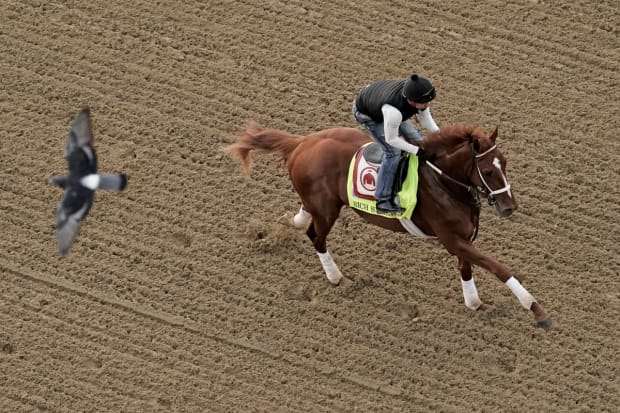LEXINGTON, Ky.—Just about everyone has assumed that miracle Kentucky Derby winner Rich Strike’s next race will be the Preakness Stakes on May 21. The horse appears to have bounced out of the Derby in good shape, and thus is compelled by tradition, market forces and the allure of a Triple Crown to contest the second leg in Baltimore.
But on this idyllic patch of land off Russell Cave Road where Rich Strike resides, crab cakes are not yet on the menu. At Mercury Equine Center, Eric Reed’s training farm on the outskirts of Lexington, they are tapping the brakes on the Triple Crown. They may well still end up at the Preakness, but nothing is certain yet.
“It’s going to be a tough, tough call,” the trainer told Sports Illustrated this week. “Saturday, I’ll know. He’s got to be 120%, not 100.”
Saturday is Rich Strike’s scheduled workout at Churchill Downs. It will be an important moment.

Charlie Riedel/Associated Press
The horse will be transported more than 84 miles from the farm to the racetrack where he made history last week. Exercise rider Gabriel Lagunes will climb on the back of “Richie” and put him through a moderate workout—nothing too strenuous, Reed said, but enough to judge whether he is ready for two big races two weeks apart.
“I can’t do anything but what’s best for the horse,” Reed said. “If we flop [at the Preakness] and he gets hurt, they’ll forget we were even there. I’ve got to remember it’s about him. If it starts being about us, that’s a problem.”
Thus a trainer no one ever heard of until Saturday night could find himself creating a national controversy. He has his reasons.
Reed acknowledged the 80–1 winner of the Derby has “got his work cut out for him” in the Preakness. The phrase “horses for courses” is rooted in long-standing fact, and Pimlico might not be the course for Rich Strike.
The Preakness is one-sixteenth of a mile shorter than the Derby, and it was about at that point when Rich Strike roared past Epicenter in the deep stretch at Churchill. There is always discussion of the tighter turns at Pimlico. And the murderous Derby pace, which set up the race for a closer, is unlikely to be duplicated. Then there is the competition: Epicenter is confirmed for the Preakness and will likely be the favorite regardless who else runs. “He was the horse I thought we had to beat,” Reed said of Epicenter in the Derby.
So, the race dynamics are working against Rich Strike. The calendar is, too.
Reed has never run Rich Strike on less than three weeks’ rest between starts and he spaces out most of his horse’s races four or five weeks apart. Many trainers opt for schedules along those lines now. The Triple Crown, an early-20th-century construct with three races in a span of 35 days, runs counter to that approach.
(For at least 15 years, I’ve advocated for changing the Triple Crown to the following calendar: The Kentucky Derby stays on the first Saturday in May; the Preakness moves to the first Saturday in June; the Belmont is contested on the Fourth of July, when the competition for viewers is midseason baseball and hot dog eating contests. It would increase the chances of horses running in all three legs, but when American Pharoah ended a 37-year Triple Crown drought in 2015, no one wanted to consider those changes anymore.)
In a vacuum, Reed would keep a colt bred for distance out of the Preakness and point him toward the 1 ½-mile Belmont on June 11, the third leg of the Triple Crown. (If Rich Strike hadn’t scratched into the Derby at the last minute, the plan was to point him toward the Belmont with a prep race—the Peter Pan Stakes—in between.) Racing in the Run for the Roses and Belmont and skipping the Preakness is an increasingly popular strategy for everyone who doesn’t win the Derby.
But for the Derby winner? That would be wildly unpopular.
The last time a healthy Derby winner skipped the Preakness was 1985, when Spend A Buck was instead lured to the Jersey Derby by a $2 million bonus. In 2020, trainer Bill Mott had no real interest in the Preakness after winning the Derby by disqualification with Country House, and when that horse spiked a fever, he had a reason not to go. (As it turned out, Country House never ran another step after winning the Derby at 65–1.) Trainer Todd Pletcher, who has had little use for the Preakness, reluctantly sent Derby winners Super Saver (’10) and Always Dreaming (’17) to Pimlico. Both finished eighth. Pletcher bowed to the racing tradition in part because, as one of the leading trainers in America, he had a stable full of other candidates for the big races.
Eric Reed? No such luxury. This is the horse of a lifetime, to be handled with care. If that means standing up to the entire racing industry and deflating the Triple Crown, he might just do it.
“Man, we’ve only got one Richie and might not get another one,” he said. “So we’ve got to do what’s right. No matter how much glory and fun and stuff is out there, at the end of the day when he retires from racing, if we made the right decisions, none of this will matter. We’re going to go if he says it’s O.K. If Richie tells me by Saturday to go, we’re going.”







